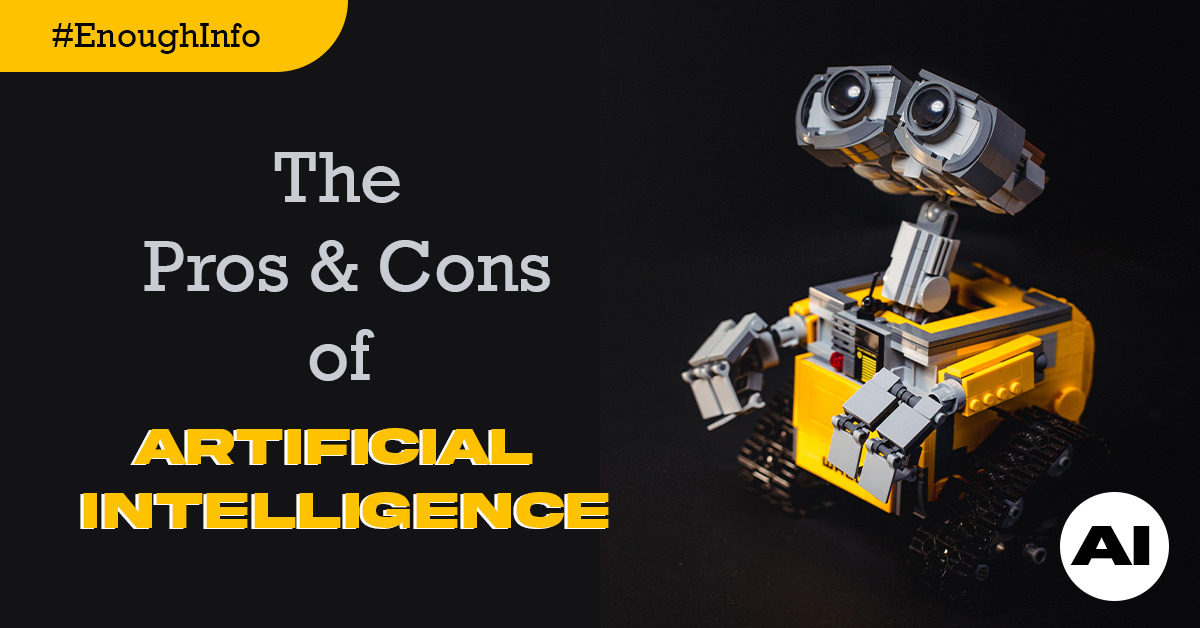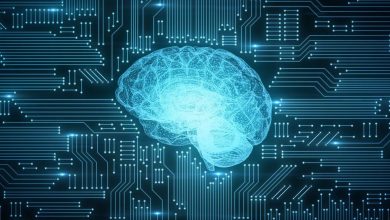The Pros And Cons Of Artificial Intelligence

The Pros And Cons Of Artificial Intelligence: The development of Artificial Intelligence (AI) has always generated much interest. Currently, AI automation strategies are being used by all sectors. It aids in the enhancement of regular corporate operations. However, AI does have several drawbacks that should not be ignored. In this article, I’ll go over the advantages and disadvantages of using AI in the real world.EnoughInfo.com

What is Artificial intelligence (AI)?
Artificial Intelligence (AI) refers to the ability of computer systems or machines to perform tasks that typically require human intelligence. AI enables machines to simulate human cognitive functions, such as learning, reasoning, problem-solving, perception, and decision-making. It involves the development of algorithms and models that can process and analyze data, learn from patterns, and make predictions or decisions based on that information.
AI can be categorized into two main types: Narrow or Weak AI and General or Strong AI.
1. Narrow or Weak AI:
This type of AI is designed for specific tasks and has limited capabilities. Examples of narrow AI include virtual assistants like Siri or Alexa, recommendation systems used by streaming services, fraud detection systems used in banking, and image recognition tools used in social media.
2. General or Strong AI:
This type of AI possesses a higher level of intelligence and can understand, learn, and apply knowledge across a wide range of tasks, similar to human intelligence. However, true general AI that can fully replicate human intelligence and consciousness is still a theoretical concept and has not yet been achieved.
AI can be further categorized into various subfields, such as machine learning, natural language processing, computer vision, robotics, expert systems, and neural networks, among others.
Machine learning is a subset of AI that involves training algorithms and models to learn from data without being explicitly programmed. It uses techniques such as supervised learning, unsupervised learning, reinforcement learning, and deep learning to enable machines to learn from experience and improve their performance over time.
Natural language processing (NLP) is a subfield of AI that focuses on enabling machines to understand, interpret, and respond to human language. It involves tasks such as speech recognition, language translation, sentiment analysis, and text generation.
Computer vision is a subfield of AI that enables machines to interpret visual information from the world, such as images and videos. It involves tasks such as object detection, image recognition, facial recognition, and scene understanding. How To Blend In Procreate(All You Need to Know)
Overall, AI encompasses a wide range of technologies, approaches, and techniques aimed at creating intelligent systems that can perform tasks that typically require human intelligence, with the potential to revolutionize various industries and aspects of daily life.
FAQs & Answers on The Pros And Cons Of Artificial Intelligence
1. What are some legal and regulatory challenges associated with AI?
Legal and regulatory challenges associated with AI include determining liability and accountability for actions or decisions made by AI systems, ensuring compliance with existing laws and regulations, and developing new frameworks to govern the ethical use of AI. The rapid advancement of AI has outpaced the development of comprehensive legal and regulatory frameworks, posing challenges in addressing potential legal and ethical dilemmas.
2. How does the quality of data impact AI systems?
The quality of data used to train and feed AI systems can significantly impact their performance and fairness. Biased or incomplete data can result in biased AI models, leading to biased decision-making and unfair outcomes. Data privacy concerns, data availability, and data quality are important considerations in the development and use of AI systems.
3. Can cost and accessibility be barriers to AI adoption?
Yes, implementing and maintaining AI technologies can be expensive, which may create barriers to adoption, particularly for smaller businesses or underprivileged communities. Cost and accessibility issues could potentially exacerbate inequalities and create a digital divide, limiting the benefits of AI to certain groups or regions.
4. How important is responsible and ethical development and use of AI?
Responsible and ethical development and use of AI are crucial to ensure that the benefits of AI are realized while minimizing potential negative impacts. It is important to prioritize ethical considerations, adhere to regulations, and develop responsible AI practices to ensure that AI technologies are used in a manner that respects human values, promotes fairness, and mitigates risks.
The Pros Of Artificial Intelligence
Artificial intelligence is advancing towards a smarter world in the current day. AI is assisting in the development of sophisticated automation systems that can free up human time for useful activities. Therefore, we will analyse the many advantages of AI in this section of the pros and drawbacks of AI.
1. Lower Human Error Rates
Because people make errors occasionally, the term “human error” was coined. But if computers are correctly programmed, they don’t commit these errors. With artificial intelligence, choices are made using a certain set of algorithms and information that has already been obtained. As a result, mistakes are decreased and there is an opportunity to achieve accuracy with a higher level of precision.
2. Helps in Repetitive Jobs
Machines, unlike people, do not need breaks to recuperate from fatigue and increase output. The repetitive actions that humans perform on a daily basis are numerous. While doing the same work continually, a human’s efficiency declines. A human worker can only be productive for 8 to 10 hours a day, which is also a reality.
On the other hand, AI-based robots support the long-term, uninterrupted performance of repetitive activities. Artificial intelligence enables the machines’ indefinite operation while maintaining productivity. One of the main benefits of AI that has contributed to its acceptance in every industry is this. Manufacturers utilize artificial intelligence to continually make things to satisfy consumer demand and generate high profits.
3. Consistent Availability
Only 7-8 hours a day can an average worker devote to work. Humans must maintain a healthy balance between their personal and professional lives. They are unable to work nonstop.
Here, artificial intelligence aids in giving an organization around-the-clock services. Another possibility is that customer care apps utilize AI-based chatbots that can respond to several inquiries concurrently and around the clock. AI has the ability to give services instantly and effectively. Artificial intelligence is being used in support chat on every eCommerce application, e-learning website, healthcare industry, educational institution, etc. This contributes to improving customer service. How To Season Cast Iron Without Oven
4. Making the right decisions
Artificial intelligence’s capacity for wise decision-making is one of its benefits. The AI-based machines don’t have any feelings, which helps keep efficiency from being hampered. Artificial intelligence-powered devices are also capable of rational decision-making. A person would evaluate a scenario by taking into account several elements. These elements may have an emotional or practical impact on the choice. However, because they are designed to make rational conclusions, the machines provide precise outcomes. Cognitive computing is a tool that AI-powered machines use to make timely, useful judgments.
5. Risk-takers as opposed to Humans
One of the main benefits of artificial intelligence is this. By creating an AI robot that can perform perilous tasks on our behalf, we can get beyond many of the dangerous restrictions that humans face. It can be utilised efficiently in any type of natural or man-made calamity, whether it be travelling to Mars, defusing a bomb, exploring the deepest regions of the oceans, or mining for coal and oil.
6. Digital Support
Some of the most technologically sophisticated companies engage with users using digital assistants, which eliminates the need for human personnel. Many websites utilise digital assistants to deliver user-requested content. We can discuss our search with them in conversation. Some chatbots are built in a way that makes it difficult to tell whether we are conversing with a person or a chatbot.
7. Daily Applications
Daily tools like Apple’s Siri, Windows’ Cortana, and Google’s OK Google are regularly utilised in our daily activities whether it be for location-based searches, selfies, phone calls, email replies, and many other things.’
8. New Inventions
It goes without saying that AI is driving a number of global breakthroughs that will aid humans in solving challenging situations. Doctors recently used the power of AI-based technology, for instance, to predict breast cancer in its earliest stages. How To Increase Testosterone Naturally(A Complete Guide)
The Cons Of Artificial Intelligence
The practical benefits of AI have been extensively studied. We’ve already established that AI has both positive and negative aspects. While artificial intelligence (AI) has numerous advantages, it also presents potential drawbacks and concerns. Some of the cons of AI include:
1. Ethical concerns
As AI becomes more sophisticated, ethical concerns arise around issues such as bias, fairness, accountability, transparency, and privacy. For example, AI algorithms can inadvertently perpetuate bias or discrimination if they are trained on biased data, leading to unfair or discriminatory outcomes in decision-making processes.
2. Job displacement
As AI and automation technologies advance, there is a concern that they may lead to the displacement of human workers in certain industries. Jobs that involve routine, repetitive tasks are particularly vulnerable to automation, potentially resulting in job losses and significant workforce disruptions.
3. Security risks
The use of AI also poses security risks. For instance, malicious actors can exploit AI systems to carry out cyber attacks, create fake identities, or generate realistic fake content such as deep fakes, which can have serious implications for privacy, security, and trust.
4. Lack of human touch
AI systems lack human emotions, empathy, and intuition, which can be crucial in certain domains, such as healthcare, counseling, and customer service. Over-reliance on AI without human intervention or oversight may result in a loss of the human touch, leading to impersonal interactions and reduced quality of service.
5. Legal and regulatory challenges
The rapid advancement of AI has outpaced the development of robust legal and regulatory frameworks, which may lead to challenges in areas such as liability, accountability, and responsibility. Determining who is responsible for the actions or decisions made by AI systems can be complex and raise legal and ethical dilemmas.
6. Dependence on data
AI systems rely heavily on data for training and decision-making, and the quality, quantity, and representativeness of data used can significantly impact the performance and fairness of AI models. Issues such as biased data, data privacy concerns, and data availability can affect the reliability and accuracy of AI systems.
7. Cost and accessibility
Implementing and maintaining AI technologies can be expensive, and smaller businesses or underprivileged communities may face barriers to access and adoption. This could potentially exacerbate inequalities and create a digital divide.
8. Human Reliance on AI
Over-reliance on AI systems without proper understanding or critical thinking can lead to blind trust and potential misuse. Human decision-makers may become overly dependent on AI outputs without questioning or verifying the results, which could lead to unintended consequences or errors.
Conclusion
These are a few of the advantages and disadvantages of AI. It goes without saying that AI is a very effective tool for enterprises. In actuality, AI might be quite valuable for offering creativity or breakthrough in addition to business. However, we must also take into account the flip side of the coin. Although AI is a fantastic technology with the potential to be revolutionary, it can also be used against us and wreak the most harm.
It’s important to recognize and address these concerns as AI continues to advance and become more pervasive in various aspects of society. Responsible and ethical development, deployment, and use of AI are crucial to ensure that the benefits of AI are realized while minimizing potential negative impacts. Proper regulations, guidelines, and ethical frameworks should be in place to address the challenges and risks associated with AI.




